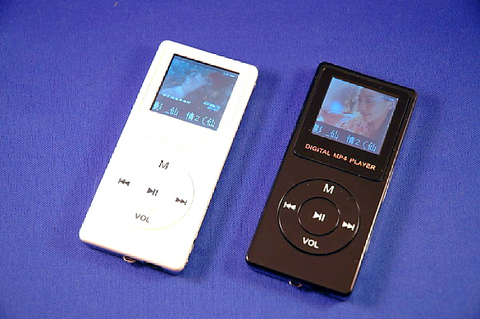As young consumers scramble to snap up Apple Computers' iPod series of portable music players, imitation products have inevitably popped up on the market. Some of these, only available through somewhat circuitous channels over the Internet, sail very close to the wind in imitating Apple's now iconic products.
These rip-offs can cost as little as half the price of the real thing, and their functions and appearance are, at first glance, indisting-uishable from real iPods. The giveaway is that they are currently only available online or after setting up an appointment.
These imitation iPods go under the name of the Nano Apple. According to a representative of the manufacturer, who would only give her surname as Chang, the devices are manu-factured in China and marketed in Taiwan under a number of different brands.

PHOTO: TAIPEI TIMES
The Nano Apple is available in three different storage capacities: 512 MB, 1GB, 2GB. If you don't look carefully, the device could easily be mistaken for original Apple iPod nanos. The most noticeable difference is that instead of "Menu," which is written on the iPod nano's dial, the Nano Apple has an "M." Also, the Nano Apple's "play" button is in the center of the dial, and volume is controlled at the bottom of the dial. Both have 1.5-inch screens, and despite the slight alteration in the placement of the function keys, the look, finish and feel of the devices makes them indisting-uishable from Apple Computer's product to the casual observer.
And of course, these knock-offs are considerably cheaper than the iPod. While the 1G iPod nano, the model with the smallest storage capacity, retails for NT$5,300, the 1G knockoff sells for NT$2,300. What's more, the knockoffs have video capability, a feature which is only available in 30G and 60G video iPods, which retail for over NT$10,000.
Despite some concerns about quality, it is no surprise that the Nano Apple is flying off the shelf, so to speak, and sites selling the device online have difficulty keeping up with demand. Anecdotal evidence also suggests that these
attractive looking knockoffs appeal to Taiwan's style-conscious youth.
For those who value function-ality over fashion cachet, it is worth noting that the smallest Nano Apple only has a meager storage capacity of 512M, and has a significantly shorter battery life than the iPod nano. Nevertheless, for those simply looking to get the latest gimmick, the knockoffs offer a cheap option. When contacted by the Taipei Times, Apple Computers refused to comment on the imitation music players.
Chinese-language media reports have suggested that the knockoff nanos do not have the same guarantee of quality as the originals, pointing out that they are made in China. Apple's own iPods are also made in China, and in a phone interview with Taipei Times, Chang said that her company, also provided full after service. According to Chang, the Nano Apple can be returned within seven days of purchase with the original receipt and packaging for a full refund.
"We provide after-sales service and irresistible functions that a real iPod nano is not able to offer. It is a simply a matter of supply and demand," said Chang.

In the March 9 edition of the Taipei Times a piece by Ninon Godefroy ran with the headine “The quiet, gentle rhythm of Taiwan.” It started with the line “Taiwan is a small, humble place. There is no Eiffel Tower, no pyramids — no singular attraction that draws the world’s attention.” I laughed out loud at that. This was out of no disrespect for the author or the piece, which made some interesting analogies and good points about how both Din Tai Fung’s and Taiwan Semiconductor Manufacturing Co’s (TSMC, 台積電) meticulous attention to detail and quality are not quite up to

April 21 to April 27 Hsieh Er’s (謝娥) political fortunes were rising fast after she got out of jail and joined the Chinese Nationalist Party (KMT) in December 1945. Not only did she hold key positions in various committees, she was elected the only woman on the Taipei City Council and headed to Nanjing in 1946 as the sole Taiwanese female representative to the National Constituent Assembly. With the support of first lady Soong May-ling (宋美齡), she started the Taipei Women’s Association and Taiwan Provincial Women’s Association, where she

It is one of the more remarkable facts of Taiwan history that it was never occupied or claimed by any of the numerous kingdoms of southern China — Han or otherwise — that lay just across the water from it. None of their brilliant ministers ever discovered that Taiwan was a “core interest” of the state whose annexation was “inevitable.” As Paul Kua notes in an excellent monograph laying out how the Portuguese gave Taiwan the name “Formosa,” the first Europeans to express an interest in occupying Taiwan were the Spanish. Tonio Andrade in his seminal work, How Taiwan Became Chinese,

Mongolian influencer Anudari Daarya looks effortlessly glamorous and carefree in her social media posts — but the classically trained pianist’s road to acceptance as a transgender artist has been anything but easy. She is one of a growing number of Mongolian LGBTQ youth challenging stereotypes and fighting for acceptance through media representation in the socially conservative country. LGBTQ Mongolians often hide their identities from their employers and colleagues for fear of discrimination, with a survey by the non-profit LGBT Centre Mongolia showing that only 20 percent of people felt comfortable coming out at work. Daarya, 25, said she has faced discrimination since she